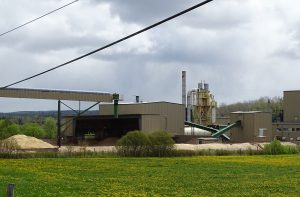UPDATE AUG 25, 2017: The deal is still in the works “likely to be finalized within about a month.” (Chronicle Herald Aug 24, 2017).
The last we heard was that “it’s déjà vu all over again in Middle Musquodoboit as former wood pellet plant operator Scotia Atlantic Biomass Company’s assets go up for grabs” (CH, Jan 10, 2017), that after it ceased production in July, 2016.
“Déjà vu” because it was the third time.
The first followed the closure of the MacTara lumber mill which in December 2000 was described to the Standing Committee on Economic Development “as the “largest sawmill in Nova Scotia and the single largest mill site operating in the Atlantic Provinces”.
At the time MacTara had been exporting 60,000 tons of wood pellets a year to Europe for 3 years via the Halifax grain terminals. The wood pellets were a byproduct of the sawmill operation:
Everything that we don’t sell as lumber or burn in our furnaces to run our dry kilns, we run through a hammer hog, and we have reduced to what they call a three-quarter inch nominal, which means that no piece should be bigger than three-quarters of an inch in any direction. We dry that material, we refine it to remove rocks, miscellaneous pieces of tramp metal, whatever else that we don’t want in the pellet. We then refine that material again and render it to a two millimetre size. At that point we put it in a press and we press it into a little piece as big as your finger. There are no additives. It is simply some high-pressure steam, bark, sawdust, chip vines, and we compress those and make a pellet. The pellets are transported from our location to the grain terminal here in Halifax and they are stored in the same silos that they would have stored wheat or corn or any other product should they have been that busy.
From there those pellets are downloaded, put onto a vessel and the vessel goes from here to Sweden. They are offloaded in Sweden and they are burned to produce hot water and hot water is pumped through the streets to each individual house to help heat the community. – Standing Committee on Economic Development (Dec 5, 2000)
The subsequent story as recounted in the CH Jan 10, 2017 (Third wood pellet plant goes bust — on same property):
When lumber demand softened and one of the company’s biggest customers went bankrupt, the lumber giant also ran into trouble. In 2007, MacTara filed for bankruptcy.
German-owned Enligna North America picked up those assets, got a Crown licence to secure more wood fibre, and began making wood pellets with the help of a $2.77-million shot in the arm from Nova Scotia Business Inc.
But only three years later, Enligna shut down too. It had failed to drum up enough business…
Scotia Atlantic Biomass picked up the wood pellet plant in 2012 and began operating it the following year. But the company, which was selling to European markets, was hit hard by a global downturn in wood pellet prices…Scotia Atlantic Biomass was losing money and it ceased production in July [2016].
Info about the Scotia Atlantic Biomass operation remains on Viridis Energy’s website:
Viridis Energy’s second facility is located in the heart of central Nova Scotia. The plant resides on a 157-acre property, inhabiting 20 operating buildings with an additional 22-acre wood lot. With the help of five pellet presses, the plant has a 120,000 metric ton production capacity annually. As one of the largest plants in Eastern Canada, Scotia Atlantic is ideally located to service the growing demand for industrial pellets in Europe. Scotia Atlantic has allowed Viridis Energy to extensively expand its capacity.
One of Scotia Atlantic’s main worldwide agents Ekman & Co AB., assists in arranging short-term and multi-year take offtake agreements for its industrial wood pellet production, with European generators that co-fire with wood pellets or have fully converted to biomass. Over the past few years, Ekman and Viridis Energy have developed a strong alliance, and will continue to flourish together in the upcoming 36 months.
Now according to the CH on August 9, 2017, the plant may have a 4th life:
Nova Scotia forestry company Great Northern Timber Group “has a tentative agreement with the Halifax office of receiver Grant Thornton to buy the plant’s machinery and equipment, along with its 157-acre property and 22-acre adjoining woodlot.
The agreement, subject to court approval, was reached recently — and only days before the mill’s assets were scheduled for liquidation at auction…Says Olesen [ Northern CEO], “GNT has been working closely with many mills to determine if the operation can be truly sustainable. We’re very pleased with the response and in particular the recognition that the mill can and should play an important role in utilizing the low-value residuals from many forestry operations….Olesen estimated that the mill will be operating again sometime between early October and late December.”
About Great Northern, the article says
Trading globally, Great Northern employs approximately 30 people in Sheet Harbour and a further 15 in other locations, including an office in downtown Halifax.
The vertically integrated company’s website says Great Northern provides commercial-scale services “from the forest floor to customers’ doors” — managing forests; buying wood by-products; and processing, manufacturing and exporting the end-products.
All this, says the website, via a port operation in Sheet Harbour, where the company has also a wood chipping facility.
Great Northern also holds a small allocation of Crown land, Olesen said.
View Pellet plant could restart soon in Musquodoboit (CH August 9, 2017) for the full story.
It’s all quite a step down from the heyday of MacTara when 340 people were employed directly, and 210 indirectly through direct contract operations but it is still good news for the Eastern Shore.
I simply hope that the new operation under Great Northern Timber is not dependent on unsustainable forestry practices or use of primary forest biomass.
Time and some public accountability will tell. One encouraging sign: Great Northern Timber holds FSC certification, at least on some aspects of its operation, also SFI and PEFC certifications.

